Pachyman: Dubbing Is A Must
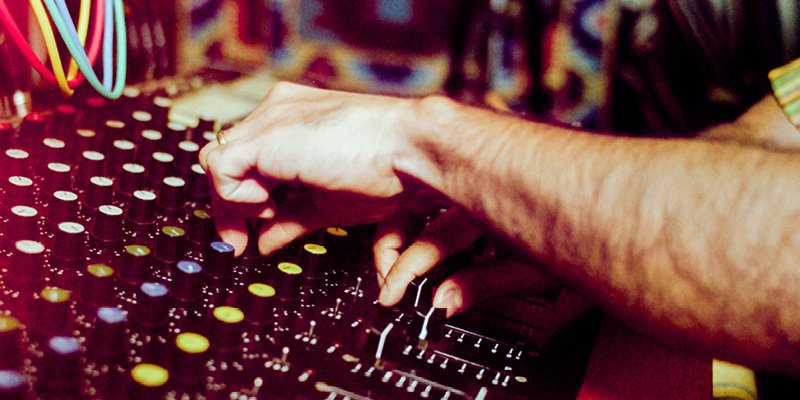
On any given afternoon, Echo Park Lake glistens in the L.A. sun as swan-shaped paddle boats circle a central fountain jetting high above lotus blossoms, while on the shore, joggers cut through the grass and vendors roast corn and spike sliced fruit with chili and lime. With the not too distant skyscrapers and constant hum of traffic in the background, this place would seem to be the heart of the action, but Los Angeles is known for keeping its treasures in more unassuming corners.
Curling up a steep side street off the lake, past peeling apartment buildings with chain link fences under towering palms we come to a wrought iron gate. Shimmy down the driveway past the wood-framed house and there’s a narrow staircase leading down to a basement studio. The cozy space is encircled with guitars, keyboards, a 1960s Hammond organ, amps, houseplants, tape machines, a vintage mixing board, and a sparkly red, off-brand Chinese drum kit. The walls are lined with textiles, art prints, and homemade sound baffles wrapped in secondhand shirts. Welcome to Pachyman’s hideout – the 333 House.
Growing up playing in reggae bands in Puerto Rico, Pachy Garcia moved to Los Angeles in 2012 and quickly found familiar frequencies in the low end vibrations at the city’s Dub Club, an easy stroll from his new home. Pachy swiftly implanted himself within L.A.’s creative community – bartending to pay the bills and playing in bands like Sex Stains (alongside Dub Club’s David Orlando) and synth-punk outfit Prettiest Eyes. In 2019 Garcia launched a solo project under the Pachyman moniker – his outlet to experiment with the deep heritage of roots dub and infuse the form with his own unique style.
As the world paused around him in the wake of the COVID-19 pandemic, Garcia ensconced himself in his basement studio to focus on recording roots dub rhythms as a way to lift his own spirits and radiate positivity to others frozen in quarantine. In a series of performance clips posted on YouTube in early 2021, Pachy runs through the tunes that would soon after appear on his album The Return of.... Since its release, the audience for Pachyman’s distinct brew has been growing as he continues to embrace the infinite possibilities of the studio. We visited Pachyman at the 333 House to hear about his circuitous journey to sketch new perspectives within familiar frames.
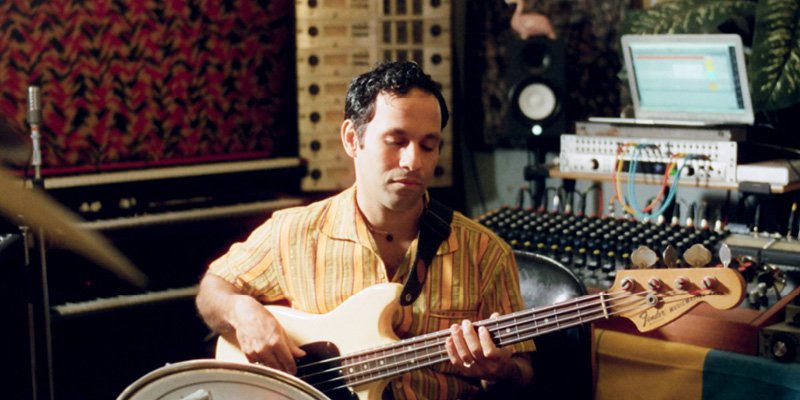
Pachyman at his 333 House studio
Do you see your studio gear as an extension of yourself as an artist or are they simply tools to help you channel what you're doing?
They're definitely tools. I'm not wrapping myself around these things. Ultimately, it's just ideas that are just flowing around. You just grab them and put them to tape. It's not necessarily dependent on the equipment that you have other than, like, basic recording stuff.
In Jamaica, during the foundation era of dub, many bands, including The Upsetters, were sometimes using cheap, knockoff instruments but it was about what they were doing with them that mattered. When did you realize that human creativity was more vital than the gear itself?
I got interested in the whole production aspect and all of a sudden it was like, oh, is it about gear, really? Buying equipment that you think is going to sound a certain way and then it letting you down, you kind of get back to the idea that it's all about what you do. And also, in my case, learning the history and studying the music that I was trying to emulate at a certain point in my life gave me that perspective. They just made incredible art with the few things that they had.
The possibilities of software when paired with the characteristics of hardware or an acoustic environment can shape sound uniquely. When did you start using a computer within your work and what role does software play?
I always had a computer. I've been working in Ableton Live for a long time, for over 20 years of my life. When I started using a computer it was because I just wanted to have something to record on. Tape machines were just basically like a storage unit for ideas. And computers are the same. They just have all these additions that people didn't have in the past. So at the beginning, I just used it as a way to record ideas. And then, I started learning how to use EQs and compressors and all these things that are now in the box. It definitely made all the difference because I now could put in perspective what all these old pieces of equipment did, just like sitting on my computer and moving a mouse around. So I learned a lot through that.
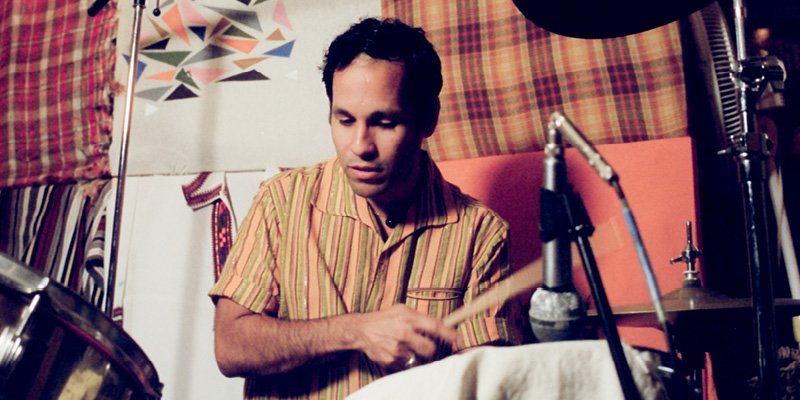
Laying down riddims to be dubbed live in the mix.
I would say that the computer does half of the work for me because I record everything into the computer before going into analog tape and mixing. I do a lot of the processing, EQing, and compressing on the computer. If I listen to my music without any of the things that I have processed, it sounds completely different. It changes everything. It really is what makes the whole thing sound listenable to me.
In dub music, drums and bass are the real foundation. Is that the starting point for you?
Yeah, that's definitely the starting point. Maybe not musically when I'm writing it, but when it comes to recording, I do start with the drums and the bass to make sure that those takes are done right.
For the most part, I work on the harmonics and the melodic part before. And I create these small sketches that I just kind of loop in my room and then I sit on the drums and figure out a pattern for that and same with the bass. Sometimes the bass starts first or sometimes the drums. I don't really sit on the drum kit unless I'm sure that I have some sort of harmonic and melodic elements that I want to work with. Which is funny because then when it comes to mixing it, I take it completely off. I just work with the drums and the bass, and the harmonics and melodics are just kind of there to be like, “Oh hey, I'm here.” And the way that dub works, it makes your brain all of a sudden understand that the drums and the bass that you're listening to are completely separate from the melodic aspect vibe-wise sometimes. And that's something that I've heard particularly through albums like Scientist Rids the World of the Evil Curse of the Vampires. Every time the harmonic and melodic parts come in, it's so separate from what you're listening to.
As you're crafting a dub, are you sort of mixing it in your mind before it exists? How fully envisioned is a piece before you start recording or does it get shaped in real time?
I would say like half and half. A lot of times I have no idea what's about to happen and I just have to figure it out when I'm doing that live mix. There's been a bunch of songs where I don't even think much about what the song is going to be, but rather the arrangement that I make at the end doing the analog mix; it's like: “I know that I'm going to start with this and then I'm going to take away the drums and I'm going to have the bass be in there for a while.”
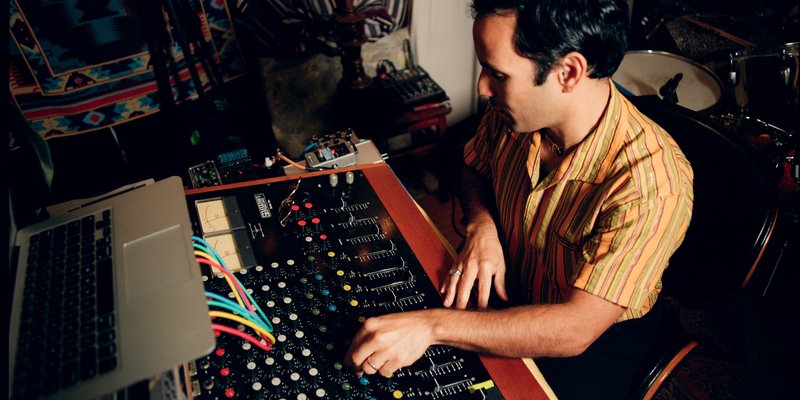
Pachyman at the controls
So if you met one of those vampires that Scientist once rid the world of, and they asked, “Hey, what do you do? What is Pachyman?” What would you say?
What it all comes down to is finding those textures from old records that I really love listening to, and not necessarily just from reggae and dub, but from a lot of music that was recorded in the 60s, 70s and up to the 80s … there were so many different textures that I feel are kind of hard to find nowadays in music. So it originally started as me trying to recreate that vibe, that imperfection that made it perfect.
You have wide ears and have played in bands focused on different genres but can you talk about your early encounters with roots dub? When did you fall in love with that sound and how did it move you? You’re from Puerto Rico, close to the source of the music.
I guess it was towards the end of high school when I started listening to reggae bands on the island and somebody introduced me to Augustus Pablo’s records. And I think... it was King Tubbys Meets Rockers Uptown that really got to me. Now, looking back, it kind of sounds like they were recording demos because they were really not paying attention to the recording aspect of it. And to me, it was just amazing the way everybody was just on point at the time of creating these records. The combination of those instrumental songs and all his harmony and melody getting mixed by King Tubby – adding all these reverbs and delays in the studio. To me, it sounded so futuristic and I couldn't really understand what was going on. I got obsessed with it and that's how it started.
And of course, I kept getting into experimental music and then finding out that krautrock and punk in the 70s all kind of congregated in this headspace where they find that [dub aesthetic] super cool as well and they're trying to take those influences and add it to their own flavor of recording. That, to me, was really important, reggae is not just this music from the Caribbean, it's this ideology of music being so futuristic that it can resonate with all these different artists across the world.
A German take on dubwise music-making: Moebius & Plank’s “News” from the 1980 album Rastakraut Pasta
Your music has an authentic vintage dub sound but it doesn't feel like a replica. It's like an innovative throwback, a new expression within the language of something that existed. Do you feel like you're keeping a foot in the future and a foot in the past at the same time?
I would like to think that I do because I'm trying to be myself. I don't want to be a knock off, an imitation. I just want to continue the conversation and embrace the things that we have at our disposal to create something new that comes from something that was very inspirational for me, personally. And this is why I work in a hybrid form. I'm not strictly trying to work in analog. I just want to make sure that I make music that I like, and there's certain things from analog that I like and there's certain things from digital that I like. And I kind of want both worlds to work perfectly for me to get there without having to sacrifice my workflow.
That's where it came from. Originally, the whole project came from me wanting to do this on my own without any pressures in the world. And all of a sudden, people saw it and they were like, oh, I like this. So that gives me the motivation factor but it also has to come back to me wanting to do it and wanting to have fun and discover new things because that's how the project happened in the first place.
Does the success you’ve had so far bring pressure to either continue along the same path or to change in order to please the listeners?
The pressures do exist. I feel like everyone goes through that if they start something and then all of a sudden it's getting noticed, you kind of get shy about it. And definitely there will be moments that you think, oh, would people like this? Whereas before, it wasn't even about that, it was about did I like it? So I want to keep that balance. I have to be happy with what I'm doing because I like to act on what's exciting to me. If it's exciting to me, it's going to be exciting for other people.
You’ve brought the Pachyman project out of the studio and into the live performance setting – was this a difficult translation technically?
It was totally difficult. I don't have a band, and first and foremost, most people are expecting bands. I've done like 80 live shows a year at this point, and I still run into people that are like, Oh, I wonder what he's going to do on stage? And I'm like, yeah, dude, same. I still wonder what I'm going to do. But transitioning the whole project from being a studio thing to a live thing, it was never intended to be that. It just kind of happened and people started liking it and I just continued doing it because it also gives me an opportunity to step away from my studio and bring the music to other people, you know?
And I'm not doing anything new. What I'm doing live has been done for decades, since King Tubby and Scientist started doing that, there were people that were already trying to figure out how to do it in a live sense. So I'm not breaking ground over here, but it's definitely been a challenge for me because I've been in bands for 25 years of my life at this point, and I've never been alone on stage. And it's instrumental music, too, so nowadays people are kind of like waiting for someone to be on the microphone so they can relate to the vocal aspect of it or the lyrics. I don't do any of that. I do bring a microphone and I try to embrace the space and engage with people, but most of the music is instrumental. I'm there with the mixing board doing the live dubs, which is a lot of work. So it's like this gray area where people don't know if I'm a DJ or not. So sometimes I do these bits to explain what I'm doing to make sure that people understand what's going on stage so they know that I produce the music.
And how do those explanation bits sort of play out?
The way that it works is that I kind of address the crowd and thank them for being there. And I always ask them, is it okay if I provide a little bit of context about what I'm doing on stage? And if the people respond to it, I go back to the mixing board, I'm like, okay, so this is how it works. And I go channel by channel, like, here are the drums, here is the bass, here are the keyboards, here are the melodies. And I do these mixes live in-the-moment. And I wrote, produced and played every single instrument. And of course, I don't like to boast, but I'm just providing a little bit of context. A lot of people get way into it afterwards because they understand now what they're listening to. They're just not seeing someone on stage dancing around and turning knobs. Which people love at the same time... I get super stoked and I engage with people on stage and they're kind of being like, Oh, this is cool, this is like good dancing music, so they vibe with it.
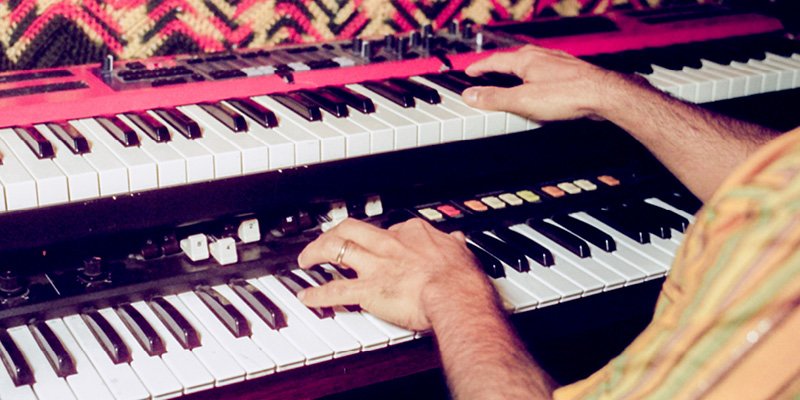
Vintage and modern keys at Pachyman’s fingertips
And is the computer the brain holding the tracks?
Yeah. I have a whole separate Ableton Live session which is just like stems. And they're coming out of my interface and going into my mixing board in four different channels. I used to bring my little tape machine and do the thing live but the machine that I have only holds 15 minutes per side and I needed to do longer sets than that. And also, it's my only tape machine at the moment that's reliable and for my studio, so I don't want to be taking it around. Plus, traveling with a computer is way easier. I just put it in my backpack. And there's a bunch of moments where in between shows, I just move stuff in the set around so I could just create different sets if I wanted to versus, like, on tape, it'd be way harder to do that.
Download a free Ableton Live project with the stems of an unreleased Pachyman track
Requires a Live 11 Suite license or the free trial.
Please be advised: This Live Set and included samples are for educational use only and cannot be used for commercial purposes.
So you're sending tracks from Ableton Live through your board and sending them to your pedals.
Yeah. There's a Space Echo, the Electro-Harmonix Holy Grail reverb pedal. And it's going through a hi-pass filter that this French company, called Westfinga, made, which is basically like a clone of the original King Tubby big knob sound.
This Pachyman body of work that you’re creating is wonderful. What do you feel is on the frontier of what you're hoping to express?
The success of my records showed me that it really doesn't have to do with the gear that you have. A good song, that's what it’s really about. And I feel like I have enough things in my arsenal to make good music. I want to find more ideas that I could bounce off and make work in the genre that I do, but also kind of deconstruct them and reconstruct them in a way that's different. I guess ultimately, I just want to try to create my own sound, my own genre, or maybe my own anti-genre. Just something that forwards the conversation of the music, trying to become more myself than anything.
Keep up with Pachyman on his website, Instagram and Bandcamp
Text and interview by Mark McNeill
Photos by Sam Lee